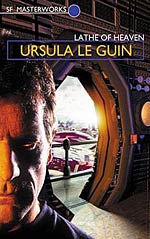
![]() digitaltempest
digitaltempest
1/7/2016
![]()
The story takes place in Portland, Oregon; the year is 2002. Portland, and much of the world, is existing under very poor conditions. George Orr finds himself on a fantastic journey after being treated for a bad reaction to drugs he obtained illegally. Because his crime is seen as a relatively minor offense, since he obtained the drugs for personal use, George is referred to a type of rehabilitation program--Voluntary Therapeutic Treatment, or VTT for short--that involves him attending mandatory psychiatric evaluations. Even though Le Guin doesn't go much into the detail of what tests and things George had to be part of, the doctors eventually send him to Dr. Haber, an expert on dreams and hypnosis--a man they send the "tough cases."
George's problem is this. He dreams what he calls "effective dreams" and things happen. He manifests new realities in his sleep, and in order to keep this from happening, he takes a drug cocktail to suppress dreaming. However, it's not as simple as he dreams something and it comes into being much to the delight/horror of others. No, his dreams retroactively manipulate time, history, even science itself to build a continuum that has always been. Therefore, no one but George has ever been aware that time has changed itself.
However, after divulging this information to Dr. Haber, George becomes the doctor's pet project once he realizes that George is not insane. Dr. Haber begins to feed George ideas while he's hypnotized to ail the world's current problems such as overcrowding, racism, and war. In each new reality, Haber becomes increasingly more powerful and fanatical about fixing the world to the horror of George. George knows the doctor means well, but the results are almost never as intended, and George firmly believes in the natural order of things.
To many people George encountered, even Dr. Haber and George's love interest, Heather LaLache, there's nothing remarkable about him. In fact, people seem to think that he's not living more than just existing, describing him as passive, timid, and frail. He appears content to allow life to happen to him rather shaping it. However, George has profound moments that surprise people, showing them that he's not as fragile and meandering as they believe. George doesn't show much initiative, but his reasons for his complicity are rooted firmly in response to his ability. He lives his life as straightforward and uncomplicated as possible, but he is nuanced.
On the opposite end of the scale is Dr. Haber, a man who not only is proactive but eventually exhibits a great need to shape himself and his world. Dr. Haber isn't an evil man, but he lacks the ability to grasp that his vision of a perfect world is hardly feasible without some sort of sacrifice, that there has to be some conflict in the world for balance. George's dreams confirm this as there is always some point of contention that has to be in play in order to fulfill Huber's vision.
Dr. Haber can't fathom that one person cannot take it upon himself to right what he perceives as the world's flaws. His blindness to this fact is exemplified by his disregard of George's fears. He feels that George's ability isn't something that George should withhold from the world. George's fears combined with feelings about his trust being abused are not as important as, what Dr. Haber considers, the needs of the many. George and Dr. Haber presented countering arguments to the question of moral obligation/negligence while Heather served as a variable for readers to observe as she changed from scenario to scenario.
Speaking of Heather, I was pleasantly surprised to find that I liked the romance in this book. When it first became obvious that Heather was going to catch George's interest, I feared that the romance might feel shoehorned into the book and would detract from the main story. Heather served a purpose as someone who's swept along in Dr. Haber's game and presents another view of how George's dream affect those around him. It helped that the romance blossomed around these changes for better or for worse, and for most of the book, it's just a cautious dance between two people who aren't sure about their place in the world.
Even though I loved this book, the scenarios seemed to get more and more outrageous a bit as the story progressed. I preferred the subtle shifting from the beginning to the comical and outlandish scenarios George is faced with later in the book. It's hard to concentrate on how thoughtful the story is when you're reading a scene that reads like it came right out of a pulpy science fiction magazine. Maybe this was very deliberate on Le Guin's part to mirror Haber's increasing fanaticism in being the world's savior, but that's only a minor nitpick.
My first experience with Le Guin was during a college literature course where we read and analyzed her short story The Ones Who Walk Away from Omelas which explored some similar ideas on a smaller scale as this book. It was always a story that haunted me throughout the years. To find out Le Guin published a novel that expanded on some of these ideas made it a must read for me.
For the most part, I enjoyed this novel. This book very much questioned moral ideas like "Is it ever okay to play God?" and "Should the needs of the many always outweigh the needs of a few?" It was a story that asked the readers to ponder these questions as we followed George on his journey. It was much more than just a science fiction novel.
http://bibliosanctum.com/2015/01/19/book-review-the-lathe-of-heaven-by-ursula-k-le-guin/